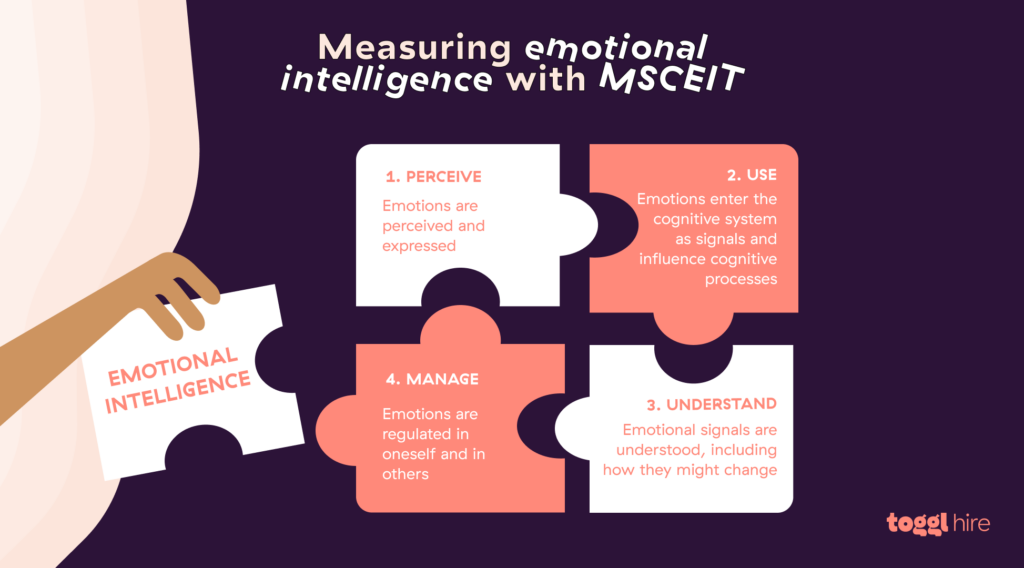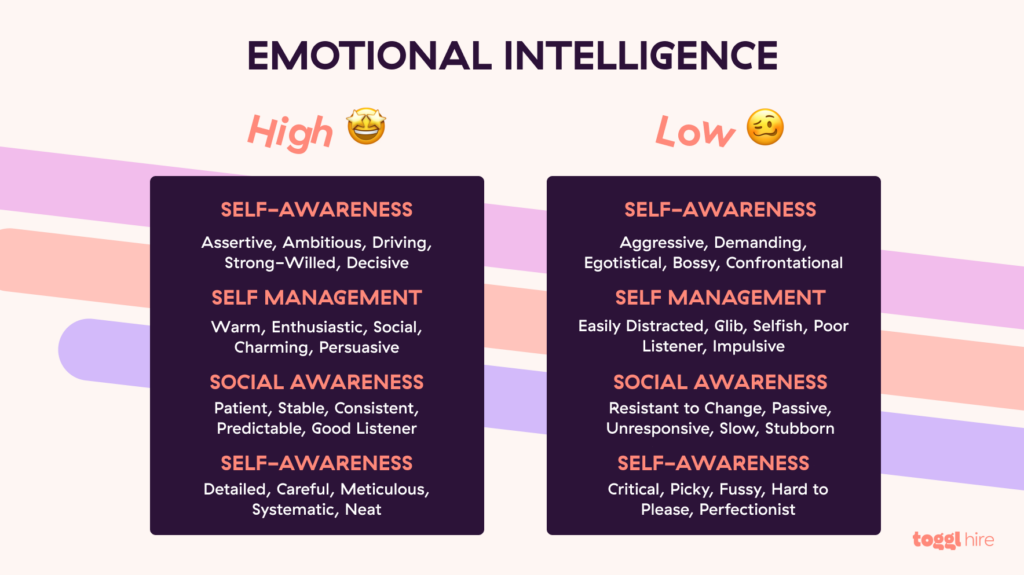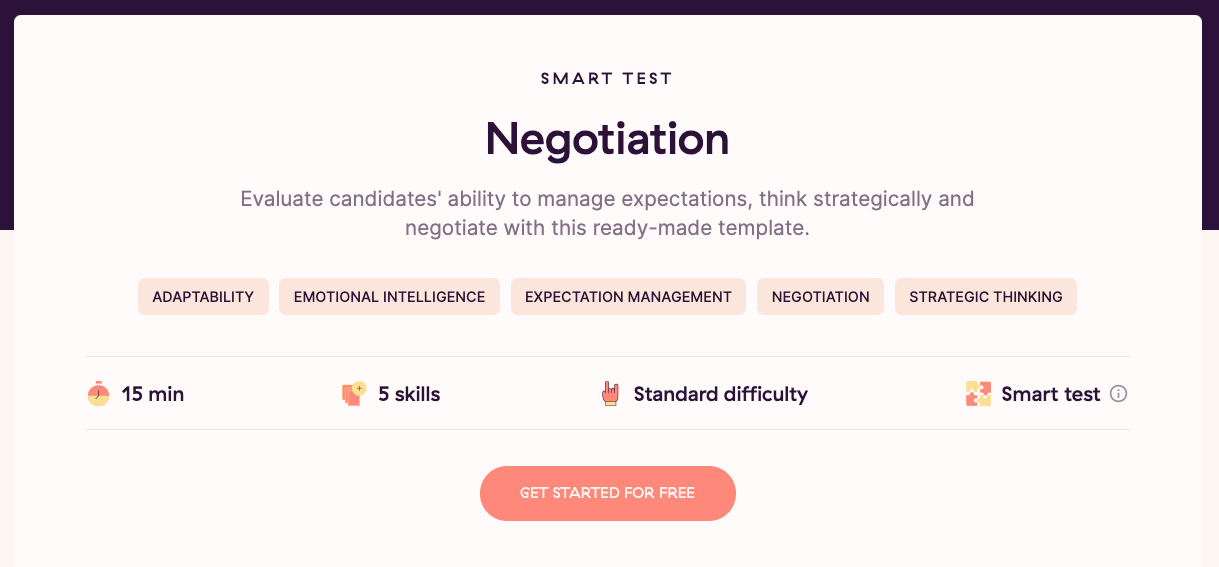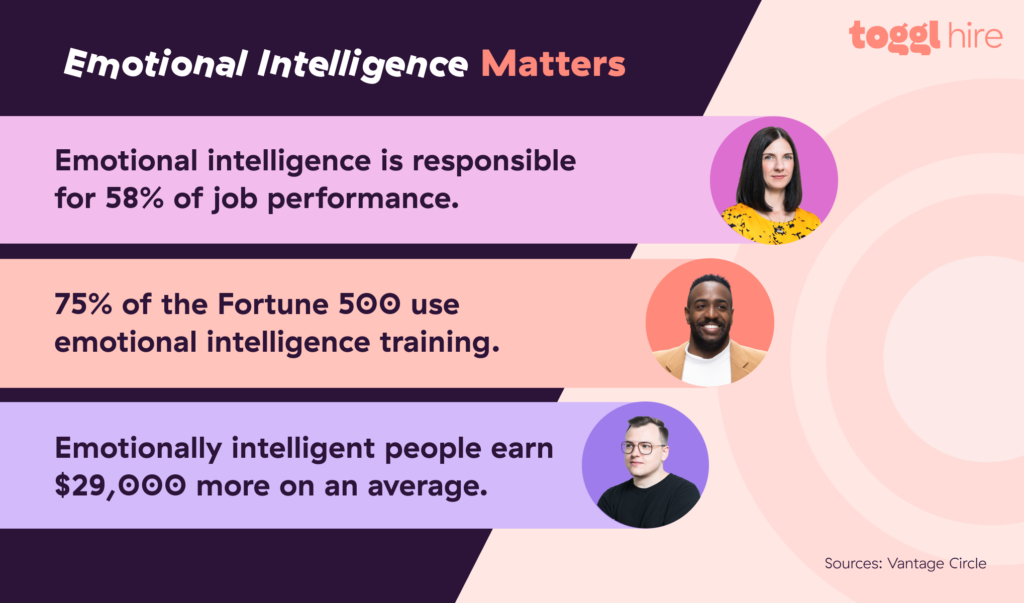Finding the right person for a job has become a perplexing task for hiring managers everywhere. Sure, you can scan a resume and cover letter (yuck), but how do you know if a candidate’s able to handle their workload and their emotions on the job?
Emotional intelligence (also known as EQ or emotional quotient) is the ability to recognize and manage your emotions, as well as the emotions of others. And if you’re hoping to gain a better understanding of a candidate’s EQ, you’ve likely stumbled upon the infamous emotional intelligence test.
While having candidates take an emotional intelligence test may give you some insight, it’s not the end-all-be-all of measuring EQ. So before you click “start,” hear us out. We’ve got the inside scoop on better alternatives to an emotional intelligence test that’ll truly measure your candidates’ abilities to handle stress, communicate effectively, and work well in a team.
🤫 Pssst! It’s better to test individual skills that demonstrate emotional intelligence than rely on a general EQ test, and we’ll show you why in a second.
TL;DR — Key Takeaways
The concept of “emotional intelligence” has been around since 1995, when it was coined by Daniel Goleman, who defined it as the ability to manage your own feelings so they’re expressed effectively and appropriately (although the term first “social intelligence” was coined by psychologist Edward Thorndike in the 1920s).
Ever since then, many emotional intelligence tests popped up online. The Mayer-Salovey-Caruso Emotional Intelligence Test (MSCEIT) is widely recognized as the standard for measuring emotional intelligence.
These tests do the job but are wildly expensive and complicated (and often inaccurate) for both employers and candidates.
Instead of assessing emotional intelligence, employers should test for individual soft skills that align with their organization and the role they’re hiring for.
Can you really measure emotional intelligence with online quizzes?
This is a hot topic in many circles in psychology. Most people who have tried them, scientists included, realized that performance-based testing is a much better way to determine emotional intelligence and cognitive ability.
This thinking is exactly what led researchers Mayer, Caruso, and Salovey to develop a multifactor emotional intelligence test and its variations: MEIS and MSCEIT. Over time, this became the standard for testing emotional intelligence, but it’s far from perfect for testing EQ in the workplace.
Instead of testing emotional intelligence as a broader skillset, it’s best to dial down and find out which specific soft skills a candidate needs to have to excel in a role. Then, test for those skills individually rather than testing for emotional intelligence as a global concept.

How is emotional intelligence measured?
Emotional intelligence can be measured in different ways. But why would you even measure it in the first place when there are so many other technical and hard skills to test candidates for?
Emotional intelligence is commonly related to good job performance, job satisfaction, and organizational commitment, among other things. In other words, someone with high emotional intelligence is likely to perform well in their job.

There are three main categories of emotional intelligence testing: self-reporting, other reporting, and testing abilities.
Self-reporting
As the name suggests, self-reporting means asking candidates to assess their own level of emotional intelligence. You ask them questions about certain situations, and the candidate tells you how they would behave in them.
Self-reporting is quick and easy for everyone involved, and it’s a solid way to understand how a candidate perceives themselves. However, the candidate needs to have a high level of EQ to perform well, meaning candidates with higher emotional intelligence will fare better in self-reporting tests.
Other-reporting
This is the exact opposite of self-reporting. Instead of asking candidates to assess themselves, you put them in a situation and have other people rank their emotional intelligence. Other people basically judge someone’s EQ well by taking a look at the person’s real-life behavior.
However, the problem here is similar to self-reporting. To rank someone’s emotional intelligence, the person performing the test needs to have great EQ themselves. If not, bias happens, and the results of this measurement are, well, highly biased.
Ability testing
To get a good sense of someone’s emotional intelligence, ability tests are probably the most accurate method of measurement. While emotional intelligence isn’t necessarily a “skill,” it can be tested as such — for example, how someone handles their own emotions.
There’s a common belief that emotions or feelings aren’t based on science or logic, but that’s not necessarily true. Like skills, emotions can be assessed with tests. For example, if you were to hire a painter for your house, you would assess their skills by looking at them paint walls, not by asking what they do when they paint walls.
Our negotiation skills test is an excellent way to test one of the key areas of emotional intelligence. It’s one of the hundreds of tests you can find in our library of candidate assessment tests (that you can browse and sample for free!).

What are the signs of emotional intelligence?
So far, we’ve shown that emotional intelligence can be tested. However, it cannot really be quantified. How could we, after all, assign a numerical value for how well someone can stay calm in difficult situations or how they embrace change in the workplace?
While we can’t measure emotional intelligence with numbers, we can observe it in different situations and behaviors. Here’s what a highly emotionally intelligent candidate might look like:
✅ They can describe how they’re feeling (as well as accurately perceive how others around them are feeling)
✅ They show a strong sense of empathy towards other people
✅ They embrace and recognize their own mistakes instead of blaming others
✅ They are successful at managing their own emotions in difficult situations
✅ They are curious by nature and like to discover new things
✅ They are aware of who they are, and they have just the right amount of self-confidence
✅ They are honest about what they can and cannot do
The five components of emotional intelligence
Research has uncovered five components commonly associated with emotional intelligence. Again, this might not be the best or most professional method to provide you with a complete overview of someone’s EQ, but here’s how each relates to performance in the workplace.
🤔 Self-awareness: Being able to recognize and understand your own emotions, strengths, and weaknesses. In the workplace, this translates into being able to receive feedback, adapt to new situations, and build and maintain relationships.
⚖️ Self-regulation: Being able to control yourself in the workplace: your emotions, stress levels, impulses, and how you spend time at work. Most of all, this refers to self-discipline when showing emotions under pressure and in difficult life situations.
💪 Motivation: Being able to motivate yourself to get the job done. In other words, having intrinsic motivation and persistence to start and complete tasks and goals while also having a positive attitude towards work and striving for excellence.
❤️🩹 Empathy: Understanding the emotions of others around you at work (i.e. being able to “read the room” and adjust behavior to any situation).
💬 Social skills: Being able to communicate well with others, listen actively, and being able to resolve conflicts and network with peers and coworkers. At work, this looks like being able to collaborate and adapt to new situations, as well as lead and influence when necessary.
While these are all great starting points for building EQ scores, many people (especially neurodivergent individuals) struggle with ticking all of the boxes for emotional intelligence. This doesn’t necessarily make them bad candidates — it’s simply another reason why an EQ test may not be the ideal way to test candidates for these kinds of soft skills.
🤔 Did you know? Various studies on EI in the workplace suggest a retention rate of 400% higher, employees who feel 50% more inspired by their work, and more than 40% improved productivity. One study found the ROI of EI training to be nearly 1,500%.
Emotional intelligence in the workplace
If you’re hiring for a new role, having an emotionally intelligent candidate is crucial. These candidates have great interpersonal skills; they’re empathetic towards others, extremely self-aware, and remain calm in stressful situations, both at work and in life.
They’re also more likely to have amazing social skills, collaborate well in the workplace, resolve conflicts, and influence and lead others. As a soft skill, emotional intelligence is a crucial part of hiring and by testing for it, you ensure a better overall fit for your team.
However, EQ is just one small piece of the hiring puzzle. Aside from testing for emotional intelligence and adding relevant EQ skills to your job description, you should also test for other skills, both soft and hard, to get a holistic overview of someone’s fit for your team.
Already have a strong candidate who ticks most of your boxes but lacks some of the soft skills associated with emotional regulation? It may be worth investing in emotional intelligence training to help them become the ideal candidate you (and their future coworkers) are looking for.

How to assess emotional intelligence in candidates
Have you figured out the big secret by now? Using EQ tests to assess emotional intelligence isn’t such a great idea. They can be wildly inaccurate, alienate entire groups of people (such as neurodivergent candidates), and they don’t exactly fit into the modern hiring process.
Instead, rely on these assessment techniques to ensure you make the right decision when hiring and end up with a highly-skilled new employee. 👇
Option 1: Emotional intelligence questions
If (for whatever odd reason) you don’t want to implement skills assessments as part of your hiring process, you can still test for emotional intelligence in a different form. Simply ask the right questions during the interview process to determine how emotionally intelligent a candidate is.
Emotional intelligence questions to assess self-awareness
Can you identify specific situations that lead to emotional responses for you?
When it comes to managing your emotions, what are your strengths and weaknesses?
What is your emotional state right now?
Describe a situation where you felt stressed or overwhelmed. How did you handle it?
How do you typically handle criticism or feedback?
Do you think that your mood has a major impact on how you make decisions?
Situation-based emotional intelligence questions
A coworker of yours constantly fails to meet deadlines, halting the performance of the entire team. How do you break it down to them, keeping in mind both their feelings and the workplace performance?
You receive negative feedback from your client about a project where you’ve been the team lead. How do you do you self-regulate and respond to the client in a balanced, thoughtful manner?
A major deadline is approaching for your team, and you’re falling behind. How do you relay the situation to your team, show empathy, and increase productivity all at once?
Your colleague seems upset and distracted in social situations at work. How would you offer support and show they can rely on you without being overly intrusive?
When asking questions as part of an interview process, create scenario-based questions that are similar to what the candidate would actually encounter on the job at your workplace. To ask accurate questions, ask current employees about self-regulation issues they’ve had in the past or situations in which they find it difficult to manage emotions.
Option 2: Emotional intelligence skills assessments
Instead of running an EQ test or relying on random questions anybody could Google an answer for, jot down the soft skills required for a role. For example, someone in a development team lead role needs to have excellent communication, leadership, problem-solving, and time management skills.
Once you have that list, test for those specific soft skills.
Once the candidates pass the soft skills test, use the in-person (or virtual video) interview as an opportunity to confirm that skill set. During that interview, ask scenario-based, work-related questions instead of general EQ test questions that are unrelated to the role.
Start assessing candidate EQ
Emotional intelligence tests are fine if you’re looking to waste time on your lunch break. But when assessing and hiring candidates for a business, you want to use tests that predict performance and behavior on the job.
Toggl Hire helps you test for soft skills that matter for your job openings. Don’t settle for generalized EQ tests — use Toggl Hire to test for the skills that are actually relevant to the job you’re hiring for all the way throughout your hiring funnel.
Explore our free test library to find the best soft skills test for your next emotionally intelligent hire! Here’s how it all works. 👇
Mile is a B2B content marketer specializing in HR, martech and data analytics. Ask him about thoughts on reducing hiring bias, the role of AI in modern recruitment, or how to immediately spot red flags in a job ad.


